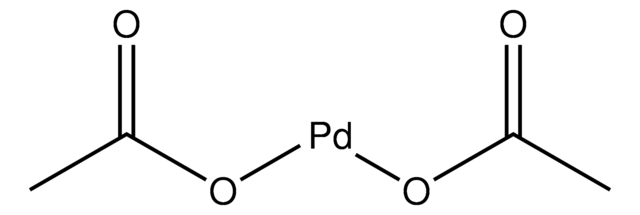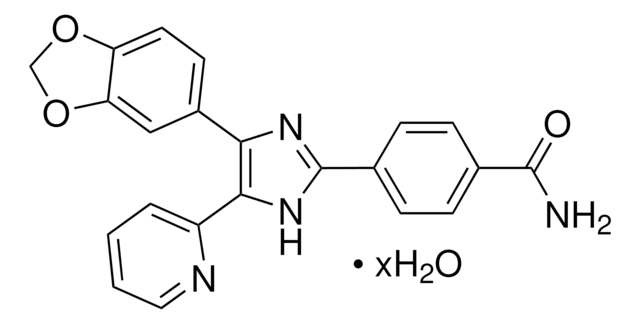SF006
ESGRO Complete Accutase
The ESGRO Complete Accutase is a cell detachment solution of proteolytic & collagenolytic enzymes, qualified for use for the detachment of mouse embryonic stem cells cultured in serum-free conditions with ESGRO Complete Clonal Grade Medium.
別名:
Stem Cell Tested Accutase
ログイン組織・契約価格を表示する
すべての画像(1)
About This Item
UNSPSCコード:
12352207
eCl@ss:
32160801
NACRES:
NA.75
おすすめの製品
品質水準
形状
liquid
メーカー/製品名
Chemicon®
テクニック
cell culture | stem cell: suitable
入力
sample type: mouse embryonic stem cell(s)
sample type induced pluripotent stem cell(s)
輸送温度
dry ice
詳細
ESGRO Complete™ Accutaseは、タンパク分解酵素およびコラーゲン分解酵素の細胞剥離液であり、ESGRO Complete Clonal Grade Medium(カタログ番号:SF001-500)を用いて無血清条件で培養したマウス胚性幹細胞の剥離に使用できることが確認されています。 ACCUTASEは哺乳類および細菌由来の生成物を含んでいません。
アプリケーション
細胞剥離:
1.ACCUTASE®を解凍して室温に戻します。
2.滅菌PBSでプレート、フラスコまたはビーズを洗浄します。
3.表面積75 cm2当たり10 mLのAccutaseを培養シャーレまたはフラスコに無菌的に加えます。
4.培養容器を37°Cのインキュベーターに戻し、細胞を剥離させます(5~10分間)。
5.通常の方法で細胞数を計数し継代します。追加の洗浄や酵素阻害剤は必要ありません。
1.ACCUTASE®を解凍して室温に戻します。
2.滅菌PBSでプレート、フラスコまたはビーズを洗浄します。
3.表面積75 cm2当たり10 mLのAccutaseを培養シャーレまたはフラスコに無菌的に加えます。
4.培養容器を37°Cのインキュベーターに戻し、細胞を剥離させます(5~10分間)。
5.通常の方法で細胞数を計数し継代します。追加の洗浄や酵素阻害剤は必要ありません。
物理的形状
凍結無菌溶液で、すぐに使用できる製剤。 各ロットは、無菌性(USPメンブレンろ過法による)、酵素活性(合成発色テトラペプチドによる試験)、および組織培養用プラスチックディッシュからの細胞剥離がテストされています。
ダルベッコのPBS(0.5 mM EDTA•4Naおよび3 mg/Lフェノールレッド)中の等倍ACCUTASE®酵素です。
ダルベッコのPBS(0.5 mM EDTA•4Naおよび3 mg/Lフェノールレッド)中の等倍ACCUTASE®酵素です。
保管および安定性
-20°Cで安定に保存可能です。ラベルのロット使用期限を参照してください。 製品受領時の保存温度も-20°Cであることが推奨されます。 ACCUTASE®は解凍後、4°Cで最大2か月間保存できます。室温では保存できません。
法的情報
Accutase is a registered trademark of Innovative Cell Technologies, Inc.
CHEMICON is a registered trademark of Merck KGaA, Darmstadt, Germany
cOmplete is a trademark of Roche
保管分類コード
12 - Non Combustible Liquids
WGK
WGK 1
引火点(°F)
Not applicable
引火点(℃)
Not applicable
試験成績書(COA)
製品のロット番号・バッチ番号を入力して、試験成績書(COA) を検索できます。ロット番号・バッチ番号は、製品ラベルに「Lot」または「Batch」に続いて記載されています。
この製品を見ている人はこちらもチェック
Darren A Cusanovich et al.
Cell, 174(5), 1309-1324 (2018-08-07)
We applied a combinatorial indexing assay, sci-ATAC-seq, to profile genome-wide chromatin accessibility in ∼100,000 single cells from 13 adult mouse tissues. We identify 85 distinct patterns of chromatin accessibility, most of which can be assigned to cell types, and ∼400,000
Lina Dahl et al.
PloS one, 3(4), e2025-e2025 (2008-04-24)
The molecular mechanisms regulating the expansion of the hematopoietic system including hematopoietic stem cells (HSCs) in the fetal liver during embryonic development are largely unknown. The LIM-homeobox gene Lhx2 is a candidate regulator of fetal hematopoiesis since it is expressed
Thangaselvam Muthusamy et al.
Stem cell reports, 3(1), 169-184 (2014-07-30)
We describe the use of a characteristic blue fluorescence to identify and isolate pluripotent human embryonic stem cells and human-induced pluripotent stem cells. The blue fluorescence emission (450-500 nm) is readily observed by fluorescence microscopy and correlates with the expression of
Na Suo et al.
Glia, 67(7), 1320-1332 (2019-03-01)
Oligodendrocytes (OLs) are the myelinating glia of the central nervous system. Injury to OLs causes myelin loss. In demyelinating diseases, such as multiple sclerosis, the remyelination is hindered principally due to a failure of the oligodendrocyte precursor cells (OPCs) to
Hsi-Lung Hsieh et al.
Stem cell research & therapy, 12(1), 549-549 (2021-10-23)
Intravenous thrombolysis using recombinant tissue plasminogen activator (rt-PA) is the standard treatment for acute ischemic stroke. Standard-dose rt-PA (0.9 mg/kg) is known to achieve good recanalization but carries a high bleeding risk. Lower dose of rt-PA has less bleeding risk but
ライフサイエンス、有機合成、材料科学、クロマトグラフィー、分析など、あらゆる分野の研究に経験のあるメンバーがおります。.
製品に関するお問い合わせはこちら(テクニカルサービス)








